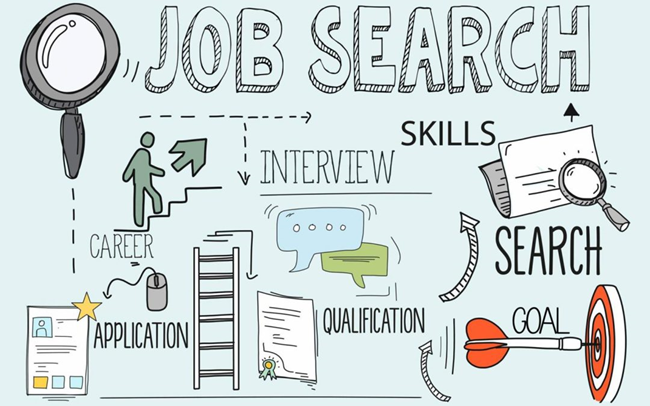Find a Job in Paris Fresh Out of University


- SUBSCRIBE
- ALREADY SUBSCRIBED?
BECOME A BONJOUR PARIS MEMBER
Gain full access to our collection of over 5,000 articles and bring the City of Light into your life. Just 60 USD per year.
Find out why you should become a member here.
Sign in
Fill in your credentials below.
It was December 2022, and I had just graduated with a bachelor’s degree in English. Graduating from college felt like a big success, but it also meant more time to realize my dream of moving to Paris.
As with any move, there were many logistics to consider throughout the six months it took me to arrive in Paris. Finding a job and getting a work visa were the first items on my to-do list. While this guide is based solely on my own experiences and research, I hope it can help others realize their dream of moving to France.
How Do You Get a Work Visa?
While there are many visa options when it comes to moving to France, my goals took me in the direction of an auto-entrepreneur visa, or an independent work visa that gives you the right to live and work in France. This visa is especially great for those looking to build their own business in France, but is different from the job-seeker visa in that you must already have some sort of business set up or a work contract before you move. However, both the auto-entrepreneur visa and job-seeker visa can be obtained in a relatively short amount of time (hence I was able to move within six months), but only if the proper documentation is presented to your regional consulate and there are no issues with your application.
To obtain the auto-entrepreneur visa, I signed up with a French tutoring company that allows private tutors to post their profiles and find students online. In addition, I asked my current employer in France, whom I found via LinkedIn, to provide me with a document stating that I would be hired on the condition that I received my visa. These two documents served as proof that I had work in France and that I was planning to set up my own English tutoring business.
During the visa application process, it’s helpful if you speak French, but not absolutely necessary. If you don’t know French, however, you will most likely need to hire a translator, ask a French friend for help, or use a reputable online translator.
I’m not in a Hurry to Move. What Are my Options?
1. Student Visa
A popular option for those who want to move to Paris is a student visa. You can sign up for relatively cheap courses through a French university, an international school based in Paris, or a study abroad program. From the U.S., the student visa also gives you the right to work for up to 20 hours per week (paid or unpaid), and it comes with the added benefit of being able to prove you studied in France and have a command of the language. This can lead to an easier visa renewal process or even finding a job after you graduate, which in turn can lead to a more permanent visa that allows you to live and work full-time in France.
2. TAPIF
The Teaching Assistant Program in France is a great option for people who would like to teach English in a low-stakes environment or who would like to test out French lifestyle before making a more permanent move. The TAPIF program runs every year for about 7 months, and you are placed in a school as an English teaching assistant. The hours are very few, allowing for lots of free time or a second job, but the visa that comes with this position does not offer much wiggle room for finding other jobs or visa renewal.
3. Find a Job with Offices in Paris
Another option if you prefer to wait to make the move to Paris is to find a job in your home country that has offices based in the City of Light. Whether you someday get transferred abroad or make a case to be moved, this option is a more secure way to move to France because your company will sponsor you, allowing you to get a better visa, receive more benefits, and save money. However, this process can take years and relies partly on chance.
Do I Really Need a Visa to Move to France?
While the above is not an exhaustive list of the visas offered by the French authorities, it is absolutely necessary to get a visa to move to France. The 90-day tourist visa does not give you the right to work in France, nor does it give you access to social security benefits. Unfortunately, this means that for Americans, moving to France on a tourist visa and hoping to find a job, student visa, or residence permit while there is ill-advised. Companies will not — and cannot legally — hire a foreigner without the proper visa, and most visas can only be renewed in France, not given initially. That’s why it’s imperative to get whatever visa you’re looking for before you move.

Photo Credit: Nexron aeliya/Flickr
Six Websites for Your French Job Search
Without a doubt, I wouldn’t be living in Paris today without the help of various websites that provide crucial information for foreigners and offer job listings. Below are six of the most useful websites I used while looking for a job in France.
1. LinkedIn
LinkedIn is a valuable tool to find jobs in France. Since I already had a LinkedIn profile, it was easy to start looking for jobs that matched my skillset. I simply put Paris as the location, along with some other filters, and waited for LinkedIn to send me a daily listing of positions I might be interested in. Using LinkedIn connected me with my current employer, who, again, was able to provide me with a document that helped me obtain my work visa.
2. Indeed
Similar to LinkedIn, Indeed is another popular job search site among both French and Americans. While I didn’t set up a profile on Indeed, I was still able to search for appropriate jobs and easily apply via Indeed or the company’s website.
A study abroad connection recommended this website to me, as it is similar to LinkedIn and Indeed but is geared toward startups and has many opportunities for bilingual applicants. Like LinkedIn and Indeed, Welcome to the Jungle is user-friendly, making it easy to apply to international jobs.
As an official organization that aids American expats and tourists in France, the U.S. Embassy in France offers comprehensive lists of international schools, English-speaking doctors and hospitals, and Franco-American organizations, among others. As I was mostly looking for teaching and writing jobs, I utilized their website to contact international schools and other organizations who were looking for English-speaking applicants. Even if you are not from the U.S., your embassy’s website is a potential resource to help you find a job or make new connections.
5. APUAF
APUAF, the Association des Programmes Universitaires Américains en France, is an informative site for students looking to study in France, and they also have a list of university-related jobs that is constantly updated. Various study abroad and international organizations utilize this site to post new jobs. If you’re interested in teaching abroad or working with groups of international high school and university students, APUAF is a great place to look.
As the official site for French administration and services, service-public.fr has come in clutch a number of times for me. While it’s not technically a job-search site, it has all the answers to your questions about applying for unemployment, finding private health insurance, your rights when you rent an apartment, and much more. Fair warning: the website is entirely written in French, although an automatic translation to English is available for most pages.

Job Dating. Photo Credit: ECE Paris Ecole d’Ingénieurs’s/Flickr
Networking Is Key
While those websites listed above are great resources for anyone looking to find a job in Paris, nothing is quite as valuable as networking. Having already lived in Paris and met people through my study abroad program certainly made my job search and move easier. Although there’s much research to be done before an international move, you don’t have to know specific people in France right off the bat. Don’t be afraid to reach out to people via social media or cold email when networking. Whether or not you’ve already established connections abroad, here are three ideas to help you widen your network.
1. The American Library in Paris
While the American Library in Paris does not offer jobs to foreigners without a specific type of visa, they have many long-term volunteer opportunities (and even internships for students). In addition, it’s a friendly, welcoming place for American expats and book lovers alike. Getting an annual membership does cost money, but a membership gives you access to thousands of print and digital books, printers, a quiet place to work or study (with free WiFi), and a knowledgeable staff. Even if you are not a member, you are welcome to check out their website or contact them with questions.

American Library in Paris. Photo: David Griff
2. INSPIRELLE Online Magazine
Bonjour Paris isn’t the only expat magazine in town — INSPIRELLE online magazine is another great resource for expats, particularly women, living in Paris or who simply love the City of Light. They welcome articles from writers of all backgrounds and provide a great foundation for networking through various events.
3. Paris Lit Up
A study abroad connection recommended the Paris Lit Up literary magazine to me, which is a great opportunity for writers to meet with a monthly writing group, publish their work, and discuss with other English-speaking writers based in Paris and internationally.
While this guide is not exhaustive, these are some of the things I’d wish I’d known during my job search or that helped me move to Paris in only six months. No matter your age, career, or other goals, know that it’s entirely possible for you to follow your dreams and move abroad.
View this post on Instagram
Lead photo credit : The Seine in Paris. Photo credit: Luc Mercelis/ Flickr/ Public domain
More in moving to Paris





